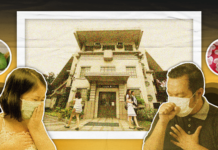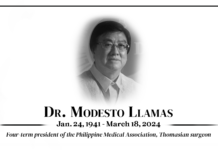SOCIAL media is supposed to connect more people, but a new UST study showed users could in fact be lonelier.
Fear of missing out (FoMO) exists when an individual is anxious of being left out and feels the constant need to know what the others are doing, according to the study by Marc Eric Reyes and his co-authors.
Their study — “Fear of Missing Out and its Link with Social Media and Problematic Internet Use among Filipinos” — focused on a kind of social anxiety that stems from not being in touch with the events in the cyber world.
“It is an anxiety that emanates from the feeling that you are not up to date because of the phase social media [and] news pass very quickly,” said Reyes, a professor from the College of Science and a clinical psychologist.
A total of 1060 Filipinos completed their tests, which measured their FoMO scale, social networking time use scale (SONTUS), and Internet addiction.
They found that Filipinos are extensively engaged in social media, specifically in Facebook, which results in Problematic Internet Use (PIU).
Fifty six percent of social media users suffer from FoMO and 51-percent of Filipinos engage in PIU, which is linked to FoMO.
PIU has been described as the incapacity to control an individual’s use of the Internet that leads to adverse consequences, specifically physical, emotional and social or functional impairment.
Those who habitually post four or more times per day in social networking sites are most likely to be affected by it.
Reyes and his co-authors noted that FoMO is associated with negative emotions such as loneliness, boredom and depression.
People who suffer from FoMO have a tendency to yield misinterpretations that others might be having more rewarding experiences than them. These individuals fail to perceive that the posts they see on social media is a polished version of someone’s life.
They oftentimes end up feeling sad and lonely because they substitute social media contact for real personal interaction, increasing their sense of isolation.
“They have the fear of not being able to have [enough] social skills to engage with people. They [are afraid to] say something wrong and be judged from something they say,” Reyes said.
According to the statistical report of We are Social, 67 million internet users nationwide spend an average of nine hours and 29 minutes per day on the Internet.
Reyes and his co-authors also argued that the Filipino’s engagement in social media and Internet to satisfy the need for “relatedness” is not sufficient to replace a face-to-face interaction.
“The social media platform is a good way of engagement” Reyes said. “But it also brought you farther, in a sense that you tend to brush off contact very easily or sometimes it becomes very impersonal.”
Reyes and his co-authors hoped that their study, which was published in the North American Journal of Psychology 2018, would raise the awareness of readers about the current status of social media use and PIU among Filipinos. Beatriz Avegayle S. Timbang, Miguel Alejandro IV. A. Herrera, Floridayne C. Capio and Roland Adrian D.C. Ignacio













